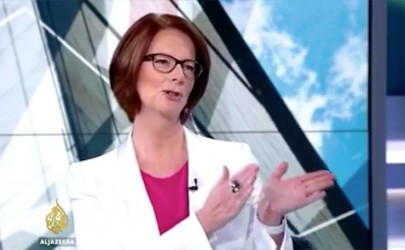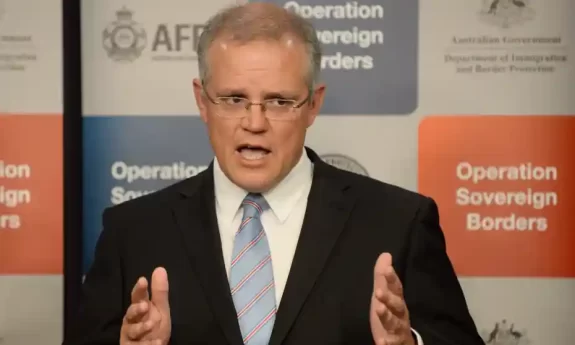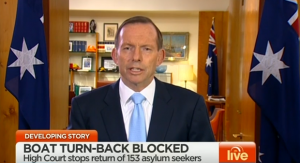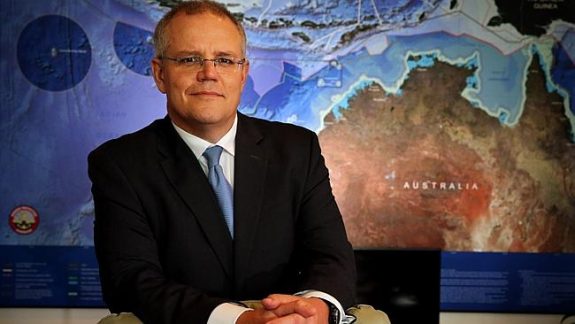There’s little doubt that Scott Morrison is the Abbott Government’s most notorious minister. We read about him almost daily, largely about his hard-line towards asylum seekers, and given his new portfolio we await similar stories about a hard-line attitude towards welfare recipients. But apart from his regular appearances in the media we know little about him. George Venturini sheds more light on the man, taking us through a four-part series about the enigmatic Scott Morrison.
Arise Scott John Morrison, Lord Sixwords of Cronulla!
But why Sixwords? Simple: Eine Sprache, ein Gezetz, ein Kultur – translated into ‘One Language, One Law, One Culture’ for the benefit of the ‘boys of Cronulla’, Morrison’s grand electors.
Scott John Morrison, born on 13 May 1968, is a member of the Australian House of Representatives for the Liberal Party. He was elected in the 2007 for the federal Division of Cook, an electorate in the southern suburbs of Sydney, which includes Cronulla, Caringbah, Miranda and Sylvania. After the Liberal Party was elected to government at the 2013 federal election, Morrison was appointed the Minister for Immigration and Border Protection.
At age 46 he became the most powerful person in the Australian Government of Prime Minister Tony Abbott.
When on 8 December 2009 Morrison became Shadow Minister for Immigration and Citizenship he won the accolade from the newly elected Leader of the Opposition, Tony Abbott, who referred to Morrison as “a great talent who was one of the bright new stars of the new generation of MPs.”
Five years later no other minister, not the Prime Minister himself – or his Deputy, the Foreign Minister, not the Attorney-General, reached the same unchecked control over the lives of other people. He became the only minister not answerable to anyone for his decisions – a dictator within the most Right-wing government in Australian history.
At 8.06 in the morning of 8 December 2014 the House of Representatives passed the Migration and Maritime Powers Legislation Amendment (Resolving the Asylum Legacy Caseload) Bill, which had been approved in the early hours of the day by the Senate and returned to the House as amended, into Act 135/2014.
The Act is a very complex, lengthy piece of legislation, which restores the failed policy of temporary protection visas introduced by the Howard Government – a process which, once lifted, increased the number of boat arrivals. The resolution of “Asylum Legacy Caseload” refers to the failure by the Rudd/Gillard/Rudd governments to “stop the boats” – which would become one of the slogans of the Liberal/Country Party Opposition during the electoral campaign concluded with victory of the Coalition in September 2013.
“Stopping the boats” of the Orwellianish described as ‘unauthorised maritime arrivals’ has been for years ‘the policy’ of both wings of what passes for a tropical rendition of the Westminster System in Australia: the Conservative Coalition and the Australian Labor Party. It was to become the ultimate step of cruelty to asylum seekers which began with the introduction in 1992 of mandatory detention of such arrivals.
In fact the new Act will go much further than what appears as a house-cleaning operation. It frees Australia from any obligations associated with the Refugee Convention and half a dozen of other international treaties or conventions to which Australia is a party – but by which it has long ceased to abide.
The Act confers upon the minister, Morrison until 21-23 December 2014 and after that his successor, and his Department of Immigration and Border Protection the power to return people to persecution, torture and possibly death; that decision is not subject to judicial review.
For all practical purposes Morrison would become and his successor will henceforth be effectively above the High Court.
How did Morrison get there?
As Nick Bryant, a former BBC correspondent from Australia, noted in The Monthly of February 2012, Scott Morrison was born and grew up in Bronte, one of the affluent eastern suburbs of Sydney, now one of the wealthiest enclaves of Australia’s richest parliamentary constituency. His family background, however, could hardly be described as part of the élite. Rather, Bryant wrote, “it was strongly Christian and communitarian.”
His father was a police commander who founded the local Boys Brigade in Bondi Junction, played rugby for the local Randwick team and was an active member of the local Returned and Services League of Australia. His mother worked in administrative positions. Outside their day jobs, Morrison’s parents ran youth programmes for the local church. His father was involved in aged care and served as a local-government councillor for 16 years.
Scott Morrison was an active member of the Uniting Church in Bondi Junction, and became “a dedicated Christian”. He is now a Pentecostal, a member of the most rapidly growing denomination in Australia. He worships at an American-style mega-church called ‘Shirelive’ in his constituency, where the ‘gospel of prosperity’ is preached in an auditorium which can accommodate over 1,000 members. With its water baptisms and designer-shirt pastors, ‘Shirelive’ has close ties with the better-known ‘Hillsong’ community. The founder of Hillsong, Harley Davidson-riding pastor Brian Houston, is one of Morrison’s mentors.
In Who’s Who Morrison lists the church as his number one hobby. The inaugural speech that he delivered on 14 February 2008 reads in part, as will be seen, like a personal testimony delivered on the last night of a church retreat. It is heavily larded with passages from Jeremiah and also from the Book of Joel: “Your old men will dream dreams, your young men will see visions.”
Maybe there was not enough money in the family to send young Scott to one of those (too many) private schools which are designed to instil ‘the values’ of Australian society in young aspiring leaders: conformity, a ‘Christian’ education, ‘good manners’ and the feeling that a ridiculous and backward looking uniform, cadet training, a traditional tie, a fanciful head-cover, and plenty of money would ‘buy an education first’, and the entry into the better-offs later. Still, Morrison’s formal schooling was privileged: he was sent to Sydney Boys High School, one of the best in the public sector. He proceeded to the University of New South Wales, where he received an honours degree in applied science, studying economics and geography. It is there, perhaps, that young Scott established his values and aspirations in life – officially: marketing, tourism, property, politics. [Emphasis added] The Italics seem critical. The official Parliamentary page describes his occupations before entering Federal Parliament: National Manager, Policy and Research Property Council of Australia 1989-95; Deputy Chief Executive, Australian Tourism Task Force 1995-96; General Manager, Tourism Council 1996-98; Director, NZ Office of Tourism and Sport 1998-2000; State Director, Liberal Party (New South Wales) 2000-04; Managing Director, Tourism Australia 2004-06; and Principal, MSAS Pty Ltd 2006-07.
After graduation he was fortunate, despite some ‘rough seas’: while in the employ of the Tourism Task Force he found a way of jumping ship to its main rival, Tourism Council Australia. Afterwards, the Tourism Task Force changed its employment contracts to prevent others from “doing a Morrison”.
When the New Zealand government looked around to set up an Office of Tourism and Sport, it favourably considered an application by Morrison. He distinguished himself for promoting the highly acclaimed ‘100% Pure New Zealand’ campaign, but also came under fire from the Labor Opposition for acting as a sidekick to the tourism minister who had appointed him. When his benefactor was forced to resign for corrupt practices, Morrison lost his protector. He turned that to his advantage and was able to terminate in advance his contract, at a price – in his favour of course.
In March 2000 Morrison returned to Sydney, where the Liberal Party offered him an appointment as State Director. The Liberal Party prides itself on being a ‘broad church’. It is quite possible that in Sydney Morrison came into contact with one sample of such ‘liberality’. One comes to think of one Lyenko Urbanchich, or Ljenko Urbancic. The precise name is of no importance. His activity in the Liberal Party is. Arriving in the l950s, Urbancic found his natural den in the Liberal Party in Sydney. It was he who invented ethnic branch-staking in Australia. Through that every aspect of nefarious activities took place, particularly the profound hatred for Jews which had become one of Urbancic ‘specialities’ as broadcaster of Radio Ljubljana, in that part of Yugoslavia which was occupied by Fascists and German troops.
Having joined the pro-Nazi party Zbor in early age, while at university Urbancic became a capable organiser and propagandist. In early October 1943 he wrote his first pro-Nazi article and organised the first SS-supported Home Guard volunteers – the Slovensko domobranstv, Slovene Home Guard. Domobranci Urbancic wrote for Jutro newspaper, another source of collaboration with the Fascist-German occupiers. From the very beginning of his career he had pledged his blind loyalty to General Leon (or Lav or Lev) Rupnik, Slovenia’s puppet ‘president’. At the end of the war Urbancic fled from Slovenia, was later arrested but released from British custody in 1948, and arrived in Australia as a Displaced Person in late 1950.
For over two decades he stacked Liberal branches along the eastern sea-board part of New South Wales. His control of the Liberal Ethnic Council of New South Wales, set up in 1977, was absolute. His faction was openly called ‘the Uglies’. It did not die with the death of Urbancic in 2006; on the contrary, it continued by the care of an Upper House’s member – with quiet success. The key to that is anti-Semitism – broadly defined, and most of the time discreet, whispered, nudge-nudged and wink-winked. The transfer of that prejudice was to embrace in an attitude of diffidence, in time mounting to hatred, for most people from the Middle East (in a convenient Anglo ‘definition’): ‘the Arabs’, the Turks – who won at Gallipoli, the Lebanese – often lambasted as ‘bloody Lebs’, the Iraqis attempting to take refuge after ‘the good, real-Australians’ had recently invaded and devastated their country, and of course the Israelis, and the Palestinians. So Morrison was, quietly at first, in his comfortable milieu.
Morrison presided over the organisation of the Liberal Party in New South Wales, earning the praise by future Prime Minister John Howard, who said that he had never seen the state party better organised.
In 2004 Morrison landed the position of Managing Director of the new government tourism body, Tourism Australia. The Federal Member for North Sydney, Joseph Benedict “Joe” Hockey – who since his re-election in 1998 held a number of ministerial portfolios including Small Business and Tourism, Human Services and Employment and Workplace Relations, who was later made Minister for Financial Services and Regulation, and since the return of the Coalition to government in 2013 has been Treasurer – secured for Morrison the position of Managing Director of Tourism Australia 2004-06. The salary was a not insignificant: $350,000, yearly. Morrison gained a tremendous success, in Australia, with the campaign based on the slogan “Where the bloody hell are you?” Abroad he encountered considerable troubles, particularly in England, where the adjective ‘bloody’, so commonly used in Australia, is considered ‘not kosher’ according to the advertising regulations, which incidentally had not been read and/or understood by the enthusiastic Morrison. Americans and Germans had no problem with the word. The Japanese, to whom the publicity was principally directed, did not understand a word of the slogan. As far as they were concerned the campaign flopped.
There were also problems with the board of Tourism Australia, the nine members unanimously regarding Morrison as aggressive, intimidating, arrogant, authoritarian, secretive and exclusive. The matter was settled by allowing Morrison to resign, quietly but under no uncertain pressure. The matter carried a tag of $300,000 for a ‘gentlemanly separation’.
The time was not too far for Morrison to demonstrate “through [his] actions his Christian faith and the value [his] family placed on public and community service.” and to declare, as he would in his inaugural speech in February 2008, that: “In our family it has never been what you accumulate that matters but what you contribute.”
It was probably after the ‘separation’ that Morrison turned his attention to securing a seat in the federal Parliament. He had taken up residence in the seat of Cook. The Division of Cook, an Australian electoral division in the state of New South Wales, was set up in 1969 and is named for Captain James Cook, who mapped the east coast of Australia in 1770. The division, located in the southern suburbs of Sydney, includes the suburbs of Cronulla, Caringbah, Miranda and Sylvania.
The seat was held by the mild-mannered Bruce Baird from October 1988 to November 2007. Baird had held seriatim the posts of Minister for Transport, Minister for Sydney’s Olympic Bid and Minister for Tourism between 1988 and 1995, in a New South Wales Coalition government. He had an interest in Tourist Training Australia and the Tourism Education Service. But that was the only thing that Morrison and Baird had in common. Baird along with fellow Liberal members of parliament Russell Broadbent, Petro Georgiou and Judith Moylan would actively oppose mandatory detention of asylum seekers.
In April 2007, when Baird announced that he would retire at the next election, a fierce battle over his successor ensued. One Michael Towke was initially pre-selected as the Liberal candidate, but allegations surfaced that Towke had engaged in branch-stacking and had embellished his résumé. The allegations were subsequently proven false. But the damage had been done – by careful arrangement.
The ‘Right’ and the ‘Left’ in the Liberal Party engaged in one of the most vituperative pre-selection campaigns in the State history.
Morrison was not supported by either side, Baird remained decently neutral, and Morrison – who ostensibly had remained out of the fray – finished a long way back on the first ballot, receiving just 8 votes, against 82 to Towke.
It was then, and because of the arranged allegations, that the state executive of the New South Wales Liberal Party rushed to dis-endorse Towke and to hold a new pre-selection ballot. Morrison won the seat at the election; he is the current sitting member.
Scott Morrison presented himself as a Liberal moderate in his first speech to
Parliament.
As Julian Burnside, a prominent Melbourne barrister and human right advocate, recently pointed out, once in government, Morrison unrelenting, programmatic cruelty to asylum seekers, “sat oddly with his avowed religious views, and his maiden speech in Parliament, delivered on February 14, 2008.
Among other things, Morrison said: “I turn now to the most significant influences on my life – my family and my faith. Family is the stuff of life and there is nothing more precious … For me, faith is personal, but the implications are social – as personal and social responsibility are at the heart of the Christian message …”
He drew on the example of William Wilberforce (the great English anti-slavery campaigner). He quoted Desmond Tutu as saying: “we expect Christians … to be those who stand up for the truth, to stand up for justice, to stand on the side of the poor and the hungry, the homeless and the naked” and was inspired to add: “These are my principles.”
It is lucky he identified his principles so clearly, because no one would be able to discover them by watching his behaviour as immigration minister.
As minister, Morrison was more concerned to ensure boat people were treated so harshly that the prospect of being locked up in Manus or Nauru would act as a “deterrent”: it had to look more alarming than the risk of dying on the sea in the attempt to reach safety. He was responsible for holding more children in detention than any previous government. He presided over a system that was calculated to humiliate, degrade, damage and break people. And, worse than all that, Morrison deceived us into thinking that all this was being done for the benefit of the Australian public.
Morrison’s conduct as immigration minister is impossible to reconcile with his stated Christian beliefs. He visited the detention centre at Manus Island on September 26, 2013, and delivered a clear message that the transferees would remain at the centre until they went home or resettled in a country other than Australia. This stands awkwardly alongside a passage from Matthew 25:35: “For I was hungry and you gave me food, I was thirsty and you gave me drink, I was a stranger and you welcomed me”, a message at the heart of the Christian teaching he claims to embrace.”
Morrison was not destined to stay on the Opposition backbench for long. The Leader of the Opposition in 2008, Malcolm Turnbull, believing that he would recognise a fellow traveller from the ‘moderate wing’ of the party, elevated him to the Shadow Ministry as the spokesman for Housing and Local Government. But it was the immigration portfolio handed to him by the new Leader, Tony Abbott, in 2009 which provided the vehicle for his rise to prominence.
Some of his colleagues have criticised such rapid move to ‘the right’ under Abbott and have accused Morrison of “supreme opportunism”. The test was not long a-coming.
In December 2010, 48 asylum seekers died while attempting to reach Christmas Island by boat. Morrison’s attitude to the event was bitterly criticised by both the government and his own party for comments he uttered after the tragedy.
On 15 February 2011 the then Shadow Immigration minister questioned the decision of the Gillard Government to pay for relatives of the dead to attend funerals in Sydney.
Afterward fellow Liberal and Shadow Treasurer Joe Hockey denounced Morrison’s statements, saying that that he would “never seek to deny a parent or a child from saying goodbye to their relative.” Morrison acknowledged that the timing of his comments might have been insensitive, but did not recoil from the comments themselves.
“Do you think you run the risk of being seen as heartless on the day of these funerals to be saying – to be bickering over this money?” asked ABC reporter Barbara Miller, whose report that morning was broadcast on the programme AM.
Here is what Morrison replied: “When it comes to the question of do I think this is a reasonable cost then my honest answer is, ‘No, I don’t think it is reasonable.’ ”
The Fairfax press published a column which called him a “cheap populist”, with the outburst “harmful to the national interest”.
Caught unawares and always prone to equivocation, the Leader of the Opposition gave the remarks a lukewarm endorsement during the course of an interview with a notoriously Right-wing radio station. He said: “It does seem a bit unusual that the government is flying people to funerals.” Morrison’s comments were met with condemnation from former Liberal leaders. One called the comments “inhumane”. Another expressed his hope that “Scott Morrison is just a fringe element in the party.”
Morrison was actually meaning what he said – and much more. In a very short time, understanding how quickly and conveniently the Liberal Party was lurching to the extreme right, he readied himself to become the hard-Right’s poster boy. It did not matter that he would associate with the militantly illiterate loud-mouths of re-emerging Australian racism. He thought it convenient, nay dutiful, that he should speak for his electors, no matter how degrading their views.
Within the Liberal Party it was not outrage to motivate criticism of Morrison’s attitude; rather it was fear that the mouthpiece of such vileness was being too ambitious and going too fast in the quest for ‘higher duties’.
Reaction to Morrison’s utterances encouraged leaks from party proceedings. One came from a Shadow Cabinet meeting in December 2011. In Abbott’s absence, Julie Bishop had been chairing the meeting. She had opened up a discussion on which issues should be prioritised the following year. The record of the meeting showed that Morrison had asked, in an agitated fashion: “What are we going to do about multiculturalism?” The question could be interpreted either way, but then Morrison made his position clear: “What are we going to do about concerns about the number of Muslims?”
For a long time multiculturalism had been a word of contempt in Cronulla, and Morrison was assuming the position of spokesperson for the people in his electorate.
There had been sectarian clashes and violent acts in 2005 in Cronulla, and they had subsequently spread to nearby suburbs. The situation became particularly tense on 4 December 2005 when a group of volunteer surf lifesavers were offended by a group of young men of Middle Eastern appearance, with several other violent assaults occurring over the following week. These incidents were widely commented on in the Sydney media and are considered to be a key factor in a racially motivated confrontation the following weekend. Racial tension was already prevalent among the two racial groups due to the Sydney Gang Rapes of 2000, among other social incidents. The Sydney gang rapes were a series of attacks committed by a group of up to fourteen Lebanese Australian youths against real-Australian women and teenage girls, as young as 14. Described as ethnically motivated hate crimes by officials and commentators, the crimes were covered extensively by the news media, and prompted the passing of new laws which likely contributed to the degree of the escalation, even though a later review by New South Wales Police found that the initial incident was no more significant, of itself, than other fights between the two racial groups.
A crowd gathered on the morning of Sunday 11 December 2005 and, by midday, approximately 5,000 people gathered at Cronulla beach to protest against the recent spate of violence against locals. Fuelled by alcohol, the crowd turned to violence when a young man of Middle Eastern appearance was spotted on the beach. He was surrounded by a crowd outside a local hotel and attacked, along with similar attacks later that day. Retaliatory riots also took place that night and on subsequent nights, resulting in several more assaults, including one stabbing and even some attacks against ambulance and police officers, and extensive property damage.
The attacks were widely condemned by local, state and federal members of parliament, police, local community leaders, and residents of Cronulla and adjacent areas. A large number of arrests were made over the subsequent months, from both the initial riot on 11 December and the retaliatory riots held over the subsequent nights. Travel warnings for Australia were issued by some countries.
Morrison had not yet reached federal parliament.
But he was there in February 2013 when he was accused of vilifying asylum seekers with his hard-line reaction to the charging of a Sri Lankan man living in Sydney on a bridging visa with the sexual assault of a university student. He said that the police should be notified of where asylum seekers are living in the community if any anti-social behaviour has occurred, and that there should be strict guidelines for the behaviour of those currently on bridging visas while they await the determination of their claims.
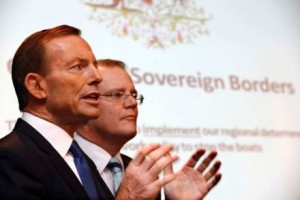
Image from radioaustralia.net.au
The new code of conduct was released by the Immigration Minister for more than 20,000 ‘irregular maritime arrivals’ living in the community on bridging visas. Before the end of the year the government announced a new rule which requires asylum seekers who arrive by boat and are in Australia on temporary visas to sign this code of conduct. Morrison repeatedly defended the use of the term “illegal arrivals” to describe asylum seekers and he had earlier said that asylum seekers have been referred to as “illegal arrivals” who “turn up illegally” on “illegal boats”. He further said that “I’ve always referred to illegal entry” – as opposed to claiming asylum, which is legal – commenting “I’ve never claimed that it’s illegal to claim asylum.”
On 18 September 2013 Morrison launched Operation Sovereign Borders, the newly elected Coalition government strategy aimed at stopping unauthorised boats departing for or reaching Australia. The practice has been controversial as it violates, amongst others, the Convention relating to the Status of Refugees and the Convention on the Rights of the Child.
In February 2014 Morrison was accused of “bungling” and “desperate cover ups” over the release of information about the death of Iranian asylum seeker Reza Barati on Manus Island. Initially Morrison had claimed that Barati was outside the boundaries of the detention centre when he was killed. Morrison subsequently retracted that claim following reports confirming that Barati was in fact murdered inside the detention centre, and therefore while under his duty of care as minister of immigration.
In September 2014 another Iranian asylum seeker, Hamid Kehazaei, was pronounced brain-dead as a result of severe septicaemia, after reportedly seeking treatment on Manus Island for days. Scott Morrison’s policies and perceived negligence have been the focus of numerous protests against conditions in detention centres on Manus Island and Nauru.
To be continued …
Updated 4/4/2016. Click on the links to access Part 2, Part 3, and Part 4.
Dr. George Venturini has devoted sixty years to the study, practice, teaching, writing and administering of law in four continents. He is the author of eight books and about 100 articles and essays for learned periodicals and conferences. Since his ‘retirement’ Dr. Venturini has been Senior Associate in the School of Political and Social Inquiry at Monash; he is also an Adjunct Professor at the Institute for Social Research at Swinburne University, Melbourne. He may be reached at George.Venturini@bigpond.com.
Like what we do at The AIMN?
You’ll like it even more knowing that your donation will help us to keep up the good fight.
Chuck in a few bucks and see just how far it goes!
Your contribution to help with the running costs of this site will be gratefully accepted.
You can donate through PayPal or credit card via the button below, or donate via bank transfer: BSB: 062500; A/c no: 10495969

